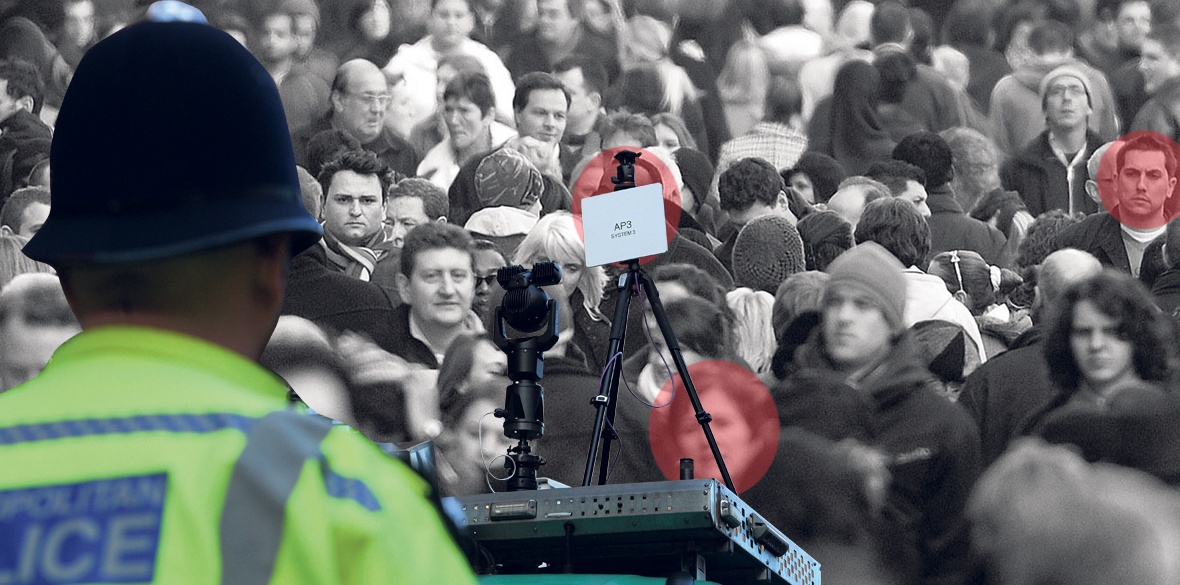This is the last article you can read this month
You can read more article this month
You can read more articles this month
Sorry your limit is up for this month
Reset on:
Please help support the Morning Star by subscribing here
POLICE could be forced to halt their use of “dystopian” facial recognition technology on Britain’s streets after campaigners won the world’s first legal challenge against it.
In a Court of Appeal ruling today, judges found that South Wales Police had breached privacy rights, data protection laws and equality laws through its use of the surveillance tools.
The force has been at the forefront of using automated facial recognition (AFR) technology, which works by scanning passers-by and comparing their faces with a secret watchlist of suspects, missing people and people of interest.
Campaigners argue that the technology is “an inherently oppressive and discriminatory surveillance tool.”
The High Court had found, in September last year, that although the force’s use of facial recognition tools amounted to a breach of privacy rights, it was not unlawful.
But Cardiff resident Ed Bridges, who has been scanned twice, and civil rights group Liberty had the decision overturned today.
The Court of Appeal ruled that there had not been an adequate data protection assessment of AFP and that the force had violated guidelines which aim to guard against discrimination.
The ruling states that South Wales Police “have never sought to satisfy themselves, either directly or by way of independent verification, that the software programme in this case does not have an unacceptable bias on grounds of race or sex.”
Liberty says it means that the force must now halt its long-running facial recognition trial, which began in 2017.
But South Wales Police disputed this, claiming that the judgement does not “fundamentally undermine the use of facial recognition technology.”
The ruling did not explicitly prevent the force from using the technology, but it will have to make changes to the systems and policies it uses for AFR.
Liberty’s lawyer Megan Goulding described the judgement as a “major victory.”
“The court has agreed that this dystopian surveillance tool violates our rights and threatens our liberties,” she said.
“Facial recognition discriminates against people of colour and it is absolutely right that the court found that South Wales Police had failed in their duty to investigate and avoid discrimination.”
Mr Bridges, who was scanned during a peaceful protest outside the Cardiff Arms Fair in 2018, said he was “delighted” with the ruling.
“For three years now South Wales Police has been using it against hundreds of thousands of us, without our consent and often without our knowledge,” he said of the technology.
“We should all be able to use our public spaces without being subjected to oppressive surveillance.”
Facial recognition technology is also being trialled by London’s Metropolitan Police.
But campaigners at Big Brother Watch say that forces in Hull, Leicestershire, Sheffield, Manchester, Birmingham, Bradford and Brighton have also experimented with it.
The group said of the ruling: “This is a huge step forward in the fight against facial recognition and should deter police from lawlessly rolling out other kinds of oppressive technologies they’ve been looking at.”
Liberty called on the government to ban the “intrusive” technology altogether.
Kevin Blowe, co-ordinator of the Netpol police-monitoring network, also raised concerns that police “will find other ways to use” the technology.
“This technology will be rolled out and there’s going to be a need for further legal challenges until there is some clear statutory basis for [its use],” Mr Blowe told the Morning Star.
He added that the judgement did not address the issue of secret databases used by police to match passers-by.
People deemed of interest to police are in an “incredibly broad category,” Mr Blowe explained, including people involved in protest movements.
“The technology is only part of the issue; it’s the databases that are behind them and how people end up on them and who the police are looking for. All these things are just as important,” he said.
South Wales Police said that it would not be appealing the court’s decision.










